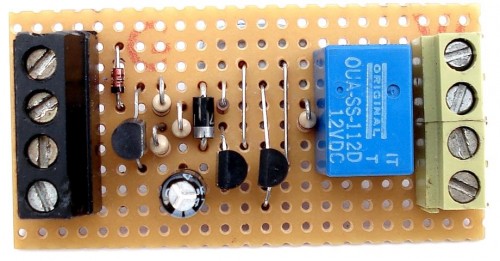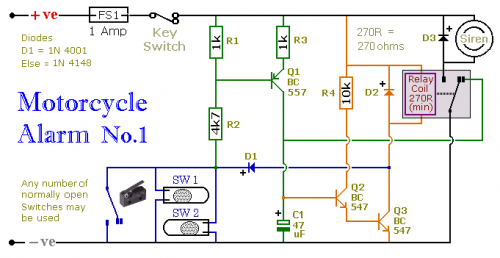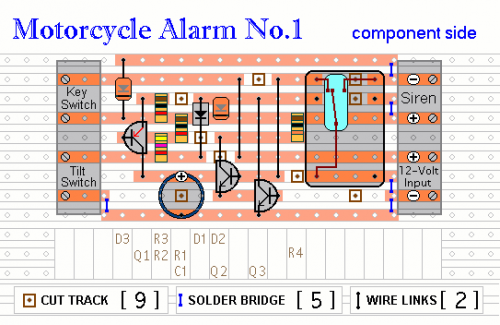FREE
circuits!
How to build A Transistor Based Motorcycle Alarm
August 3, 2010 - category: Motorcycle alarmDescription
Although designed to work at 12-volts - this alarm is easily adapted for a 6-volt system. So it will protect your "Classic Bike". And because the standby current is zero - it won't drain your battery. The circuit features a timed output and automatic reset. It can be operated manually using a key-switch or a hidden switch. But - if you add an external relay - it will set itself automatically every time you turn-off the ignition.
Schematic Diagram
Notes
Any number of normally-open switches may be used. Fit the mercury switches so that they close when the steering is moved - or when the bike is lifted off its side-stand - or pushed forward off its centre-stand. Use micro-switches to protect removable panels and the lids of panniers etc.
While at least one switch remains closed - the siren will sound. About two minutes after the switches have been opened again - the alarm will reset. How long it takes to switch off depends on the characteristics of the actual components used. But - up to a point - you can adjust the time to suit your requirements by changing the value of C1
Fit the 1-amp in-line fuse as close as possible to your power source. This is VERY IMPORTANT. The fuse is there to protect the wiring - not the circuit board. Both the board and switches must be protected from the elements. Dampness or condensation will cause malfunction. Without the terminal blocks - the board is small. Ideally, you should try to find a siren with enough spare space inside to accommodate it.
Instead of using a key-switch you can use a hidden switch - or you could use the normally-closed contacts of a small relay. Wire the relay coil so that it's energized while the ignition is on. Then - every time you turn the ignition off - the alarm will set itself.
When you set the alarm - if one of the switches is closed - the siren will sound. This could cause annoyance late at night. A small modification will allow you to Monitor The State Of The Switches using LEDs. When the LEDs are all off - the switches are all open - and it's safe to turn the alarm on.
In standby mode - the circuit uses virtually no current. This should make it useful in other circumstances. For example, powered by dry batteries - and with the relay and siren voltages to suit - it could be fitted inside a computer or anything else that's in danger of being picked up and carried away. The low standby current and automatic reset means that for this sort of application an external on/off switch may not be necessary.
Veroboard Layout
circuit from http://www.zen22142.zen.co.uk/ronj/mc1.html




 This category
This category